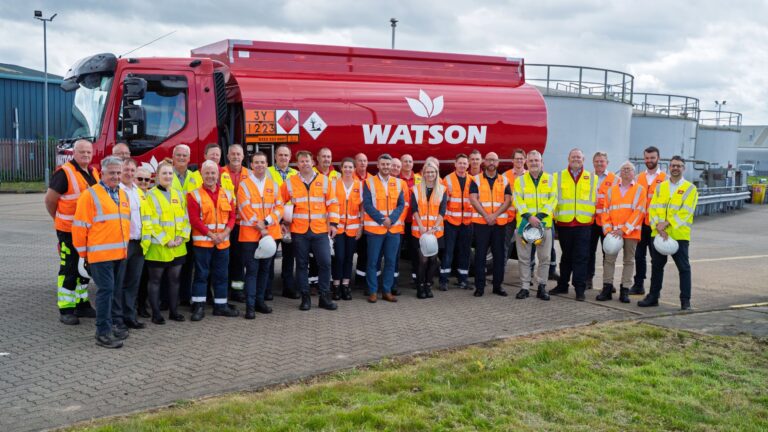
Following June’s exclusive with Inspirit Capital on the carve-out of Watson Fuels – in which private equity leaders Paul Youens and Callum Fyfe outlined their vision for accelerating growth while disentangling from World Kinect – Watson Fuels CEO Matt Whitton now shares his perspective.
Leadership, independence and a people-first transformation
As Watson Fuels nears the final stages of its transition into a fully independent business, Matt speaks to Fuel Oil News about leading through a carve-out, re-energising a trusted brand, and his vision for a customer-first, agile future. In this interview, he discusses how Inspirit’s strategic framework has been translated into action on the ground: the operational uplift, the culture reset, and the disciplined shift from being a quiet division to a confident, standalone business.
A winding path to leadership
Matt didn’t set out to build a career in the energy sector. “I studied marine biology at Liverpool Uni,” he says with a laugh. “Don’t ask how I went from marine biology to oil – or now, energy.” But a graduate role at TotalFinaElf in 2001 was the start of a trajectory that, to date, has seen him spend over two decades in the downstream energy industry, with roles at Mabanaft, Essar and World Kinect.
Initially fossil fuel-focussed, predominantly in supply and trading, his remit expanded over time to renewable fuels for the aviation and ground sectors. That broader perspective helped pave the way for his involvement with Watson Fuels in 2022. Initially engaged on the supply side, Matt took over operations in early 2024, before stepping up to Managing Director in October 2024 – just ahead of the carve-out that would see the business sold by World Kinect and acquired by Inspirit Capital.
Despite never having led a full carve-out before, Matt was aware of the plans for the business and brought deep operational insight and a clear-eyed focus on transformation. “They [Inspirit] could see a strong, ambitious exec team with a clear strategy,” he says. “That’s what they bought into.”
Navigating the carve-out
The process of separating Watson Fuels from its former parent company has been swift and deliberate. “We’ve gone through some pretty tough transitional times,” Matt reflects, “Running the business as usual while also selling it, then the early months post-sale – not quite fully standalone, but not far off.”
At the heart of Watson Fuels’ transformation is a leadership team fully aligned around a shared vision. Comprising CEO Matt Whitton, along with COO Dan Brain, CSO Shaun Galvin and CFO Chris Homer – the team plays a critical role in steering the business through its transition.
“We’ve got the four of us with our arms around the business,” Matt says. “There’s a real clarity about what we’re aiming for, and we hold each other to account in the right way.”
That ethos extends throughout the senior leadership team, which has been deliberately reshaped, following the Inspirit acquisition, to blend long-standing Watson Fuels experience with fresh expertise in technology, people, and transformation.
Tasked with expanding the team to deliver the carve-out, Matt worked with Inspirit to bring in a complementary Chair – seasoned CEO and private equity veteran Daniel Dayan – who came with a lot of experience of private equity and is the perfect link between the Watson Fuels management team and Inspirit.
Completing the team, Inspirit Capital also introduced providers of services that would facilitate the transition from a large multi-national to a true standalone business.
These final key appointments included a Director of Technology, “appropriately named” Steve Watson, who comes with experience of Inspirit and in unwinding businesses, as well as a Director of People Services, Tracie Greenhalgh, who also brings significant experience in separation and transformation as well as operational capability and cultural alignment.
“They’ve slotted in brilliantly,” Matt says. “The whole senior team is high-performing and incredibly engaged. That alignment at the top is what allows us to communicate consistently across the business – and crucially, to deliver. It’s created an environment where everyone understands the direction and feels empowered to contribute to it.”
The process has been underpinned by Transitional Service Agreements (TSAs) to maintain continuity while internal systems were stood up. As of the interview, the end of TSAs was in sight, and full independence imminent. “Very soon we move into the enablement part of our strategy – which is going to be a lot of fun.”
Empowering people at the core
At the heart of the transformation is a deep commitment to people and culture. “Enablement is the one word that flows through everything we’re doing,” Matt explains. “We’re laser-focused on customers, but equally we want every colleague to feel they can have an impact.”
Under the previous ownership, Watson Fuels had operated somewhat on the sidelines. Now, that sense of autonomy is being transformed into a culture of proactive ownership, openness, and pride.
Leadership values – integrity, honesty, pragmatism and curiosity – are embedded throughout the business, supported by face-to-face engagement and regular town halls. “I’m a strong believer in face-to-face meetings. They’re the most important ones you can have,” Matt says. “So, the biggest challenge for me, personally, is that there is never enough time in the day.”
“I would love to be everywhere, but thankfully, we have an amazing team, meaning I don’t have to be.”
Matt credits the senior leadership team, with their deep roots in the Watson Fuels culture and absolute buy-in to future ambitions, for ensuring alignment and high engagement.
“We have a number of experienced colleagues who remember how Watson Fuels used to operate. They regard the carve-out, in some ways, as returning to something close to that and are extremely positive about it, regarding it as ‘the right thing to do’.
“It is seen as an opportunity that gives everybody the opportunity to make an impact. We’ve had people throwing themselves into it – ideas, enthusiasm, ownership – it’s been brilliant.”
Building for profitability and future growth
The strong management team that was already in place prior to acquisition by Inspirit Capital, also went a long way to alleviating the challenges of maintaining the day-to-day while delivering a standalone business. Bringing the team into final sales discussions ensured that successful planning mitigated most of the operational risk.
So, with the risks under control, and an excellent team in place, day one was all about building firm foundations and establishing ambitions.
Now, with the carve-out nearly complete, the remainder of 2025 is about consolidation and preparation. “We’ve got three goals: be profitable, be independent, and be operationally sound by the end of the year,” Matt outlines. “Then, in 2026, we launch into growth.”
The decentralisation of operations and strengthening of regional presence is a big shift for the business – and one which Matt regards as a big opportunity: “It’s really exciting. At the start of 2026, we will be a local supplier who just happens to have national coverage – that’s the perception we are aiming for.”
Inspirit Capital, Matt says, has struck the right balance as an owner. “They’ve been a breath of fresh air – diligent, swift, and supportive without being overbearing. That gives us almost a superpower: the ability to pivot and transform quickly.”
The growth in 2026 could be both organic and inorganic. “We will absolutely pursue opportunities for acquisition, but we’ve also got a huge amount of potential just in doing what we do better.”
Efficiency and cost-to-serve are also major pillars of future strategy and the stated aim for 2025/26 is to “become as efficient as we can be, with the lowest cost to serve” and always with the customer at the core.
“We sell a commodity,” Matt says candidly. “It’s the delivery service and customer focus that enable us to justify the margins. So, getting those things right is critical.”
Could the efficiency drive have implications for the 500 staff currently employed by Watson Fuels? “I don’t foresee any near-term changes,” Matt says, although he acknowledges that the leadership team continue to review and analyse the evolving business. “Our focus is on enabling our team to perform and being the best business we can be.”
Putting customers front and centre
Reconnecting with customers is a priority, and the area in which Matt believes the shift from operating under the global group will be felt the most. “We always wanted to be customer-focused, but under the old structure we didn’t feel empowered to be,” he admits. “Now, we are.”
Watson Fuels is actively measuring customer experience, with structured feedback loops through marketing and people teams. “We’re not just assuming it’s getting better – we’re evaluating it.”
The aim is that customers will notice a step-change in responsiveness, service quality, and regional presence. “We expect them to feel it, and see it,” he says. “And we’re going to be asking them about it too.”
Adaptable in a changing energy world
With kerosene volumes in decline and decarbonisation high on the agenda, Watson Fuels is positioning itself as “liquid fuel agnostic”. Seven depots are already converted to hold stocks of renewable diesel (HVO), and the business is capable of pivoting quickly as customer demand shifts.
“We don’t need to invest in new infrastructure,” Matt notes. “We’ve got the trucks and tanks and can switch from fossil diesel to HVO overnight.” This operational flexibility is a significant strength, especially given the uncertainty around government policy.
In terms of future planning, “We’re hard-wired into UKIFDA,” Matt adds. “They do an incredible job, and provide essential insight on where things are heading, particularly around legislation.”
A call for clarity on renewable fuels
Asked what he’d most like from government, Matt doesn’t hesitate. “Clarity and support for renewable liquid fuels,” he says. “Why invest in a whole new downstream delivery system when the one we’ve got is fit for purpose?”
He sees the lack of clear policy as a barrier to uptake, especially in domestic markets. “Large infrastructure and blue-chip companies are adopting HVO because it’s a tender requirement or driven by ESG. But domestic adoption needs it.
“The most effective way of delivering change is through legislation. Always has been, always will be.”
Watson Fuels is not entrenched in fossil fuels, Matt stresses, with an open-mindedness over future solutions. “It’s not either-or. Electricity, hydrogen, liquid fuels – we’ll need them all. Different solutions for different needs.”
While today’s focus remains strongly on liquid fuels, Watson Fuels is not ruling out future diversification. “Right now, we’re a liquid fuels business – but we’ve got our eye on other opportunities.”
Trust, tea bags and the road ahead
Asked for the best business advice he’s received, Matt replies simply: “Work with people you trust.
“If you’re fulfilled in what you do and working with people you trust – you’re in the right place.”
And in case you’ve ever wondered – square tea bags are best. “It’s a bit of a running joke here,” he laughs. “Anyone using a square tea bag is clearly making a superior brew.”
Clearly single-minded when it comes to tea bags, Watson Fuels demonstrates far more open-mindedness in strategy terms.
“When people think of the Watson brand they picture a red truck with a white logo, but we are already a diversified company – specialist fuel division, lubricants, AdBlue, wholesale and fuel cards.”
In its new, more agile, form Watson Fuels is more ready to pivot than ever, and it seems further diversification may be on the way. Matt is tight-lipped on specifics but hints at additional services. “Spoiler alert – there’s more to come.”
With a trusted and knowledgeable team, renewed independence, and a clear strategy, Watson Fuels looks well placed to deliver on its ambitions – square tea bags and all.
Image credit: Watson Fuels
